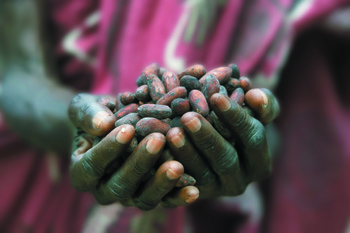 In this country called « Africa in miniature », nestled at the heart of the Equator with its head at the starting point of the Sahel, the agro-ecological zones are so diverse that there is land for all sorts of crops. According to evaluations of the Ministry of Agriculture and Rural Development, the overall arable land is estimated at about 7.2 million hectares, but only 1.8 million hectares are effectively cultivated. Likewise, while the irrigable potential is estimated at 240?000 hectares, less than 33?000 hectares are currently being irrigated. The Ministry further states that the development of Cameroon's agricultural potential "is still very poor because only 17% of the irrigable land is used, while only 26% of arable land is cultivated".
In this country called « Africa in miniature », nestled at the heart of the Equator with its head at the starting point of the Sahel, the agro-ecological zones are so diverse that there is land for all sorts of crops. According to evaluations of the Ministry of Agriculture and Rural Development, the overall arable land is estimated at about 7.2 million hectares, but only 1.8 million hectares are effectively cultivated. Likewise, while the irrigable potential is estimated at 240?000 hectares, less than 33?000 hectares are currently being irrigated. The Ministry further states that the development of Cameroon's agricultural potential "is still very poor because only 17% of the irrigable land is used, while only 26% of arable land is cultivated".
"This deficit in the development of our agricultural potential seems paradoxical in view of the manifold assets that Cameroon is endowed with, and the food needs of a rapidly growing population", the Ministry regrets, highlighting the immense potential of this vast available land known to be fertile.
New categories of investors
Naturally, this land capital is highly attractive to agricultural multinational corporations. Several major agro-industrial groups like Hevecam at Niete, in the South or the local subsidiaries of the French Fruit Company (Compagnie Fruitière française) in the Mungo area, or major private, State or joint industrial plantations such as Socapalm, the Cameroon Development Corporation, Safacam, are provided with land often in the form of leasehold contracts. However, since the world food crisis, this land capital arouses covetousness and progressively attracts new categories of investors. The new comers include China which has already received some 10000 hectares for food production, essentially rice.
To further encourage foreign investments in the agricultural sector and promote the installation of youths in this sector, the government adopted a panoply of motivating legal provisions. In the Ministry's view, these texts globally "guarantee, without discrimination, to all natural or legal persons with owner-occupied land, the right to enjoy it and dispose of it freely". The State encourages the creation and development of medium and large farms by providing land from the national estates and developing the installation area. The agricultural ventures also receive technical support for the development of their plantations. In this regard, the government recently invested 30 billion to launch an operation for the installation of 15000 youths involved in farming.
The security of land use rights and the sustainable technical management of soils are also at the heart of this strategy. Authorities promote the rights to use land by developing the modalities of formalizing rent contracts, while major foreign or local investors can benefit from leasehold contracts on particularly advantageous terms.
